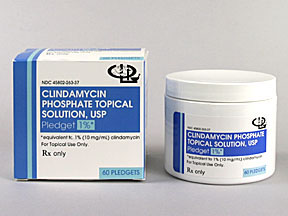
My prescription
Edit
1%, Clindamycin Phosphate (1 Swab)
Select pharmacy

CVS
$18.56
COUPON PRICE
Walmart
$2.81
COUPON PRICE
Albertsons
$3.73
COUPON PRICE
Walgreens
$3.97
COUPON PRICEClindamycin Phosphate savings card
Show this card to your pharmacist
Walmart
$2.81
BIN
ID
PCN
GRP
019876
LH57FB5A60
CHIPPO
LHX
Powered by
More prescriptions for upper respiratory infection
More prescriptions for upper respiratory infection
Price history for Clindacin Etz (brand) & Clindamycin Phosphate (generic)
1 Swab, 1%
Average retail price for Clindacin Etz
Average retail price for Clindamycin Phosphate
Average SaveHealth price for Clindamycin Phosphate
Our price history data is based on aggregated prescription data collected from participating pharmacies in America. Our prescription data updates daily to reflect the latest price changes. If you notice a missing data point, it means there wasn't sufficient data available to generate a monetary value for that date.
We analyzed Clindamycin Phosphate prices for (1%, 1 Swab) over the last 12 months. The average retail price was $23.35, while the average price using the SaveHealth discount card was $2.29. That's a savings of approximately 90.19% when using our Clindamycin Phosphate coupon.
Compared to the generic version, Clindacin Etz had an average price of $3.25 over the same time period. With the SaveHealth savings card, Clindamycin Phosphate is 29.54% cheaper on average than Clindacin Etz.
*Retail prices are based on pharmacy claims data, and may not be accurate when we don't have enough claims.
Clindamycin Phosphate dosage forms
Dosage Quantity Price from Per unit 1% 1 Swab $2.81 $2.81 1% 2 Swabs $3.11 $1.55 1% 3 Swabs $3.42 $1.14 1% 5 Swabs $4.03 $0.81 1% 6 Swabs $4.33 $0.72
| Dosage | Quantity | Price from | Per unit |
|---|---|---|---|
| 1% | 1 Swab | $2.81 | $2.81 |
| 1% | 2 Swabs | $3.11 | $1.55 |
| 1% | 3 Swabs | $3.42 | $1.14 |
| 1% | 5 Swabs | $4.03 | $0.81 |
| 1% | 6 Swabs | $4.33 | $0.72 |
Clindamycin Phosphate Warnings
When using this medication, it's crucial to be aware of the following safety information to ensure its safe and effective use. If you have any questions or concerns, please consult with your healthcare provider.
Severe Allergic and Skin Reactions: Clindamycin (Cleocin) can cause severe allergic reactions, which may include facial swelling or potentially life-threatening anaphylaxis. Rarely, it may lead to serious skin conditions such as Stevens-Johnson syndrome (SJS) or drug reaction with eosinophilia and systemic symptoms (DRESS) syndrome.
Diarrhea from Clostridioides difficile Infection: Antibiotics like clindamycin (Cleocin) can increase the risk of an infection with Clostridioides difficile (C. diff). This occurs because antibiotics can disrupt the normal bacterial balance in the stomach and intestines, leading to an overgrowth of C. diff. This infection can result in diarrhea that may be severe and life-threatening.
Development of Drug-Resistant Bacteria: It is essential to use clindamycin (Cleocin) exactly as prescribed to prevent the development of drug-resistant bacteria. Taking this antibiotic for an incorrect length of time or for conditions it is not intended to treat can increase the risk of severe infections that are difficult to manage due to resistance.
Please ensure you follow all prescribed guidelines and report any adverse effects or reactions to your healthcare provider immediately.
Clindamycin Phosphate Side Effects
Common side effects:
- burning
- itching
- dryness
- redness
- oily skin
- skin peeling
- diarrhea
- nausea
- vomiting
- stomach pain
- skin rash
- itching
Less common but important to monitor:
- metallic taste in the mouth
- yellowing of the skin and eyes (jaundice)
- joint pain
Serious side effects:
- severe allergic reactions (hives, rash, blisters, skin reddening, swelling of the lips or tongue, difficulty breathing)
- severe intestinal condition caused by C. difficile (persistent diarrhea, abdominal pain, blood or mucus in stools, rapid heart rate, fever, frequent bowel movements)
Clindamycin Phosphate Interactions
Clindamycin phosphate is an antibiotic used to treat various bacterial infections. When taking this medication, it's important to be aware of potential interactions with other substances that could affect its effectiveness or increase the risk of side effects.
Interactions with Other Medications:
Neuromuscular Blocking Agents: Clindamycin can enhance the effects of neuromuscular blocking drugs, which are often used during surgeries to relax muscles. This interaction may lead to prolonged muscle relaxation. If you're scheduled for surgery, inform your healthcare provider that you're taking clindamycin.
Erythromycin: Using clindamycin alongside erythromycin, another antibiotic, may reduce the effectiveness of both medications. It's advisable to avoid concurrent use unless directed by a healthcare professional.
CYP3A4 Inhibitors and Inducers: Clindamycin is metabolized in the liver by enzymes known as CYP3A4 and CYP3A5. Certain medications can influence these enzymes:
Inhibitors (e.g., Ketoconazole, Itraconazole, Clarithromycin): These can slow down the metabolism of clindamycin, leading to higher levels in the body and an increased risk of side effects.
Inducers (e.g., Rifampin): These can speed up the metabolism of clindamycin, potentially reducing its effectiveness.
If you're taking medications that affect CYP3A4 or CYP3A5, your doctor may need to adjust your clindamycin dosage or monitor you more closely.
Interactions with Food and Beverages:
- Grapefruit Juice: Consuming grapefruit juice can inhibit the CYP3A4 enzyme, potentially increasing clindamycin levels in your body and the risk of side effects. It's best to avoid grapefruit juice while taking clindamycin.
Vaccines:
- Live Vaccines: Clindamycin may reduce the effectiveness of live bacterial vaccines, such as the oral typhoid vaccine. Inform your healthcare provider if you're scheduled to receive any vaccines while on clindamycin therapy.
General Recommendations:
Always inform your healthcare provider about all medications, supplements, and herbal products you're currently taking. This will help them assess potential interactions and adjust your treatment plan accordingly. If you experience unusual symptoms or side effects while on clindamycin, contact your healthcare provider promptly.
